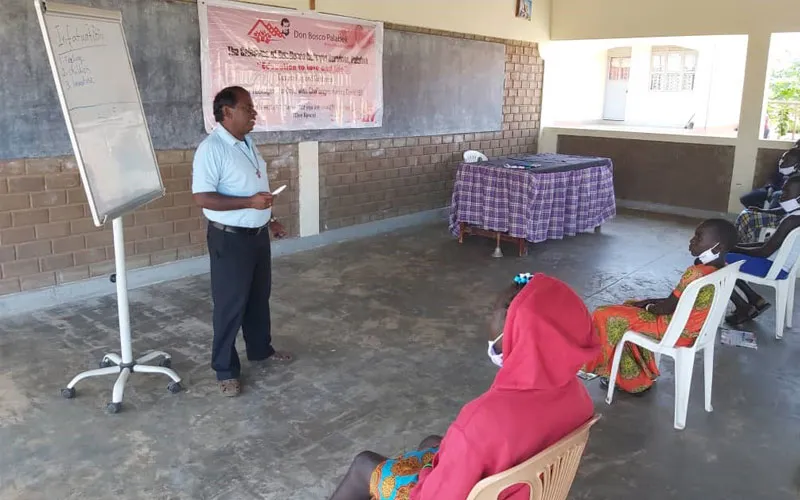The practice, he says, also has many ill effects on the society, traditional values of sexuality, marriage, upbringing of children, and family.
Fr. Arasu says that cohabitation has, to a large extent, destroyed many cultural values built for several years or centuries.
“Often African cultural ethos is built around the family and its structures. Now with the collapse of family, which is the basic social unit, many other cultural values have lost their meaning or weakened,” he says.
In his interactions with the youth in East Africa, Fr. Arasu has discovered that young people have various explanations for cohabiting and living in the notorious “come we stay” arrangements.
To justify the arrangements, young people highlight the high rate of divorce in society and say that they are spending some time together “to see if things work out”. Some say that they are saving money for marriage.
(Story continues below)
“It is not uncommon to meet cohabiting young couples vehemently defending their living together,” the Priest says, and adds, “They argue that it is the best way of coming to know each other and there is no other way of knowing each other and their compatibility better. Here compatibility also means if their female partner can really bear children.”
Fr. Arasu says that other young people find it better to separate during cohabitation rather than after church wedding, hence the infamous saying, ‘I am only trying, if it works, I will wed in the Church.’
Still, there are others whose only problem is paying bride price, the Indian-born Priest says.
“These are the reasons, excuses and procrastinations cohabiting couples give for their status quo, besides manifesting fear, ignorance and doubt, often times in a hidden way they portray a sense of self-interest, poor upbringing, disregard for culture and traditions, disrespect for elders and institutions they lead, overdependence on material things, failure to discern and make decisions and contempt for religious values and institutions such as the Church,” the SDB Priest says, and adds, “Surely, culture, society and the Church are losing their grip on people.”
“Marriage is the first casualty of today’s secularism and materialism,” the Priest asserts, and adds, “Though there is a high level of emotions and feelings involved in the union of man and woman, the institution and the sacrament of marriage is above emotions.”
Marriage, according to Fr. Arasu, involves a long period of education including counseling, catechesis, and other structured preparations. It also involves a lengthy process of discernment and finally a thoughtful and prayerful decision.
The Priest quotes Pope Francis who expresses regret that “Marriage now tends to be viewed as a form of mere emotional satisfaction that can be constructed in any way or modified at will.”
He says that for Christianity and especially for the Catholic Church, marriage is a sacrament, an external sign of an internal grace, instituted by Christ and performed by the Church.
“Marriage reflects God’s covenant with people; it is not a contract that can be based on breakable conditions and situations,” he asserts.
“Pope John Paul II who visited Africa numerous times reminded us not to allow the African family to be undermined or scoffed at on its own land,” Fr. Arasu says in his reflection shared with ACI Africa.
He notes that while so much time and energy is being given to the formation of Priests in the Catholic Church, very little seems to be going on to prepare ordinary Christians for married life.
The Missionary Priest underscores the need for the Church to realize that building good Christian families is a way to create good leaders for the Church and society.
He makes an appeal to Dioceses and Parishes in Africa to ensure that thorough preparations are made before marriage, by elevating marriage as “a priority pastoral activity.”
Additionally, married couples should be accompanied in Parishes, chaplaincies and other pastoral entities so as to help the couples to journey well in their marital challenges and understanding deeper the daily living of Christian marriage, Fr. Arasu says.
“As married couples grow in their family life, Dioceses and Parishes should help them to build a matrimonial and family spirituality,” he further recommends, and adds, “This should also involve parenting skills and other family issues such as family planning and other moral challenges related to sexuality and family life.”
“Let us keep in mind that only a healthy family spirituality will help the Church and family to grow, bring vocations and make the Church relevant in the challenging and changing times in Africa,” the Salesian Priest says.
Agnes Aineah is a Kenyan journalist with a background in digital and newspaper reporting. She holds a Master of Arts in Digital Journalism from the Aga Khan University, Graduate School of Media and Communications and a Bachelor's Degree in Linguistics, Media and Communications from Kenya's Moi University. Agnes currently serves as a journalist for ACI Africa.








